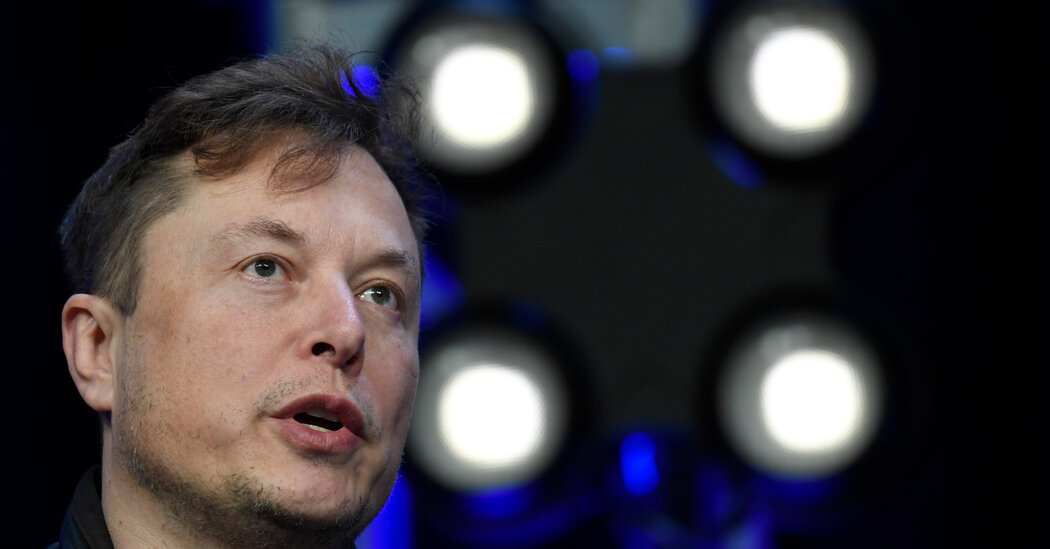
Elon Musk, chaos agent.
Mr. Musk, the world’s richest man, continued creating confusion around his $44 billion acquisition of Twitter on Tuesday, even as the social media company tried to keep the deal on course. Early in the morning, the billionaire tweeted that “this deal cannot move forward” until he got more details about the volume of spam and fake accounts on the platform.
A few hours later, Twitter said it was “committed to completing the transaction on the agreed price and terms as promptly as practicable.” It urged its shareholders to back the bid by Mr. Musk, who appeared to be carrying out a public tweet-by-tweet negotiation even though he had struck the blockbuster deal to buy Twitter last month.
Mr. Musk’s increasingly skeptical — and erratic — comments about the takeover have kept investors, bankers and Twitter itself guessing about his motives. Some analysts figure that the 50-year-old is trying to drive down the acquisition price or walk away from the deal altogether. Many were unnerved by his methods, with market-moving pronouncements made off the cuff at conferences or in emoji-laden tweets in the middle of the night.
Yet his comments are in keeping with Mr. Musk’s longtime methods of operation, where he often wings it in the biggest moments, eschews experts and relies almost solely on his own counsel. Years ago, he said that he had stopped making business plans. And people close to Mr. Musk have said that he had no plan whatsoever when he piped up with an offer to buy Twitter last month.
“I think all of this is just him making a lot of noise and showing the kind of headaches that he would cause for the company if they were to try to litigate this,” said Ann Lipton, a professor of corporate governance at Tulane Law School.
Twitter’s shares fell 8 percent on Monday and rose more than 3 percent on Tuesday. They were hovering at $38 a share, far below the $54.20 a share that Mr. Musk agreed to pay for the company and below where it traded before the billionaire initially revealed in March that he had bought a big stake in Twitter.
Behind the scenes, the two sides are proceeding with the deal: They jointly put out a regulatory filing on Tuesday. Renegotiating a deal would not be easy for Mr. Musk. In addition to a $1 billion breakup fee, the deal with Twitter includes a “specific performance clause,” which gives the company the right to sue him and force him to complete the deal so long as the debt financing he has corralled remains intact.
Mr. Musk, who also leads the rocket company SpaceX and the electric carmaker Tesla, did not immediately respond to a request for comment. Twitter’s board said in a statement: “The board and Mr. Musk agreed to a transaction at $54.20 per share. We believe this agreement is in the best interest of all shareholders. We intend to close the transaction and enforce the merger agreement.”
Mr. Musk’s latest remarks about the Twitter deal center on the issue of fake accounts on the platform. Twitter has long said in regulatory filings that fewer than 5 percent of its accounts are fake — a figure that Mr. Musk said is hard to believe. In a tweet published at 3:32 a.m. Eastern time on Tuesday, Mr. Musk said the figure could be well above 20 percent, without providing information to support his claim.
“My offer was based on Twitter’s S.E.C. filings being accurate,” Mr. Musk said in the message.
Part of the reason that the issue of fake accounts has come to the forefront now is that Mr. Musk did not conduct due diligence on Twitter before agreeing to buy the company. Potential buyers usually go to extensive lengths to study a target’s business, customers, growth potential and stock price before making an offer. But according to a regulatory filing from the company on Tuesday, Mr. Musk told Twitter that completing due diligence on the social media company was not necessary before signing an agreement.
In the filing, Twitter also warned that “if the merger is not completed, and depending on the circumstances that cause the merger not to be completed, the price of our common stock may decline significantly.” Deal uncertainty can hurt company morale and add to employee turnover.
On Tuesday, two vice presidents and one department head notified colleagues they were departing the company for new opportunities, a Twitter representative said. The departures were earlier reported by Bloomberg.
“If the bot figure is so important to his assessment of the value of the company, he should have done his due diligence on it before signing the deal,” said Erik Gordon, a professor of business at the University of Michigan. “And he should have added an explicit representation about bots to the contract.”
Mr. Musk has been building up the pressure on Twitter with his public comments questioning the deal. He began last Friday, tweeting that his purchase was “temporarily on hold” until he could get more details about the volume of spam and fake accounts on the platform. He later followed up saying that he was still “committed” to the deal.
Over the weekend, he tweeted that Twitter’s legal department had “called to complain” that he violated a nondisclosure agreement by discussing its bot sample size of 100. Mr. Musk’s deal with Twitter also has a non-disparagement clause that prohibits him from tweeting negatively about the transaction.
Then at a technology conference in Miami on Monday, Mr. Musk said striking a deal for Twitter at a lower price was “not out of the question” considering the questions about spam and fake accounts.
“The more questions I ask, the more my concerns grow,” Mr. Musk said at the event. “So you know, at the end of the day, acquiring it has to be fixable with a reasonable time frame and without revenues collapsing along the way.”
How Elon Musk’s Twitter Deal Unfolded
A blockbuster deal. Elon Musk, the world’s wealthiest man, capped what seemed an improbable attempt by the famously mercurial billionaire to buy Twitter for roughly $44 billion. Here’s how the deal unfolded:
He added that it was a “material adverse misstatement” if Twitter said it has less than 5 percent of fake or spam accounts but the figure is actually significantly more.
“Material adverse change” clauses are used by buyers to get out of or renegotiate deals if there has been serious harm to a business. But such charges rarely prevail in court. Twitter’s bot count is unlikely to qualify as a material adverse statement, lawyers said, since Twitter has publicly disclosed similar figures quarterly and there would be no clear change to evaluate. And Twitter also cautions in its regulatory filings its bot estimates may be “higher” than it estimates.
Twitter’s deal contract has eight pages of “representations”: effectively promises about the state of the company at the time of the merger, though none pertain directly to its count of bots.
On Monday, Parag Agrawal, Twitter’s chief executive, also posted a lengthy thread detailing how the company calculates its number of bots. He said the company’s internal estimates for the last four quarters “were all well under 5 percent.”
Mr. Musk later responded to Mr. Agrawal’s tweet thread with a poop emoji. He also tweeted at the Securities and Exchange Commission, indicating that he wants the agency to look into the deal. (Mr. Musk has previously been the subject of S.E.C. inquiries.)
In its filing on Tuesday, Twitter also noted the significant challenges it weighed in deciding whether to accept Mr. Musk’s bid. Bret Taylor, Twitter’s chairman, spoke with several institutional shareholders who recommended that the board consider Mr. Musk’s proposal against the risks of pressing forward as a public company.
Twitter also said that while its management and bankers received interest from other “financial sponsors and institutional investors,” none of the interested parties put forward a specific counterproposal.
Ele Klein, co-chairman of the global shareholder activism group at the law firm Schulte Roth & Zabel, said Mr. Musk’s shenanigans have put Twitter’s board in a bind.
“It then becomes a question of, if you’re the company, even though you have a really great fact pattern, how long do you want to spend fighting,” Mr. Klein said. “Life’s too short to fight with Elon Musk.”
Mike Isaac contributed reporting.




